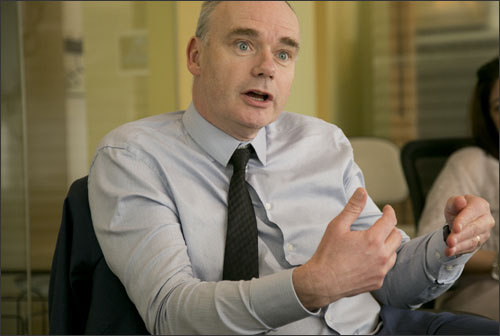Pearson CEO to Retire in 2020, and Search for Successor Begins

John Fallon, CEO of Pearson since 2013, intends to retire from his role next year, once a successor has been appointed, the global education company announced today.
Fallon oversaw the transformation of Pearson from a publishing and media conglomerate to a company focused on education only. The company took a major step in that direction in 2015 with the sale of the FT Group, which included the Financial Times. Fallon then organized Pearson around three global lines of business: school, higher education, and professional education.
Pearson has struggled in a key area—the U.S. college materials market. Earlier this fall, it had warned investors of disappointing earnings tied to poor sales in American universities.
“Over 75 percent of the company is now growing, as we work our way through a major industry-wide disruption in the other 25 percent of Pearson—U.S. higher education courseware,” said Fallon in the company’s announcement of his plans.
This year, Pearson had announced that it would go digital-first in producing all of its college-focused materials, rather than creating them in print. This marked a ramping up of a transition playing out across the publishing industry.
Pearson, whose market cap, or aggregate stock value, is $6.71 billion today, also announced this week the sale of its remaining 25 percent stake in Penguin Random House to Bertelsmann SE & Co. KGaA for $675 million.
The U.S.-based Pearson operations account for about 60 percent of revenues and employ about 14,000 workers, according to the company. Earlier this year, Pearson sold its U.S. K-12 instructional materials business for $250 million to Nexus Capital Management LP.
Among its remaining offerings for U.S. K-12 schools are assessments—high stakes and others—AP course materials, and Connections Academy, a K-12 online public school.
The company also sells higher education courseware in the U.S., as well as clinical assessments that include screening for attention-deficit disorder and dyslexia; professional licensing and certification assessments; an online program management provider, employer tuition assistance program management, and Pearson AI, an AI-powered tutor that recently launched the Aida Calculus app.
“In some very challenging markets, John has worked tirelessly leading Pearson through a period of significant change,” said Sidney Taurel, Chair of Pearson’s board, in the company’s announcement.
“Under John’s leadership, Pearson has become a simpler, more digital-focused business underpinned by a stronger balance sheet and better positioned to deliver a sustainable and healthy future.”
At times those shifts brought significant pain to the company’s workforce. In 2016, Fallon also oversaw layoffs of 4,000 employees, which represented 10 percent of the company’s workers. Fallon said he was responding to rocky conditions and poor performance in international markets and putting a greater focus on adaptive courseware and classroom products, as well as blended and online learning.
In today’s announcement, Fallon said Pearson is “investing more in our business than ever before and pioneering new forms of online education that link learning to employability.”
He acknowledged that “there’s still a lot to do but we’re making good progress in navigating Pearson through a period of huge change,” Fallon said in the company’s statement. “We’re now a much more efficient company, able to innovate more quickly and scale globally.”
Fallon said it’s time for the company to transition to a new leader, who can bring a fresh perspective. In the meantime, he will continue to lead the company.
External and internal candidates will be considered for the position as the succession process begins, Taurel said.
Photo of Pearson CEO John Fallon during a 2016 visit to Education Week’s offices, by Charles Borst.
Follow EdWeek Market Brief on Twitter @EdMarketBrief or connect with us on LinkedIn.
See also:
- Pearson Sells Its K-12 Instructional Materials Business to Investment Firm
- Pearson Goes ‘Digital-First’ in College. What Does That Mean for K-12?
- Pearson CEO Fallon Talks Common Core, Rise of ‘Open’ Resources
- K-12 Dealmaking: Pearson Gets Back in Acquisition Game; Guild Ed. Raises $157M; NeighborSchools Pulls in Seed Funding
- Pearson Set to Sell K-12 Curriculum Business, But Not Assessment
- Pearson Unveils Immersive History Curriculum, Even as Potential Sale of K-12 Products Looms
- Investors Pressure Pearson CEO for Details on Sale of K-12 Curriculum
- Education Behemoth Pearson to Cut 4,000 Employees, 10 Percent of Workforce
- Pearson to Sell Financial Times and Focus Solely on ‘Global Education Strategy’

one of the fastest apps for android.
Goodbye man and thanks for your service.
Are you kidding? John bought businesses in developing markets for too much – non-strategic assets he later sold for losses. He hired some great new talent, but would not listen to them, later firing most. He did re-.org after re-.org without clear strategies (structure follows strategy) and refused to believe the Higher Ed textbook decline was structural, constantly saying it was cyclical, so not planning on that profit decline. My only question is how the Chairman keeps his job, after watching and presiding over all of this. Absolutely disgusting
There’s still a lot to do but we’re making good progress in navigating Pearson through a period of huge change
good and detailled post.
Wow! good post thanks for sharing this. Also, check this new game click here for download. COC Private Server
Wow!! Amazing stuff is here.